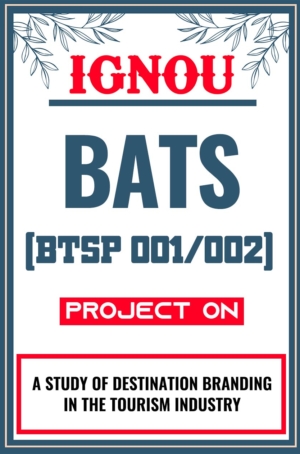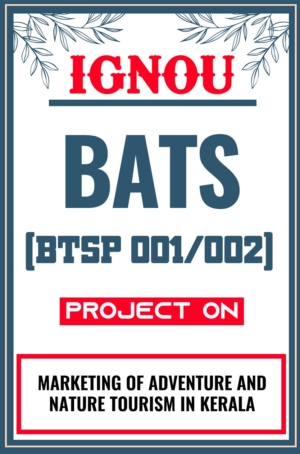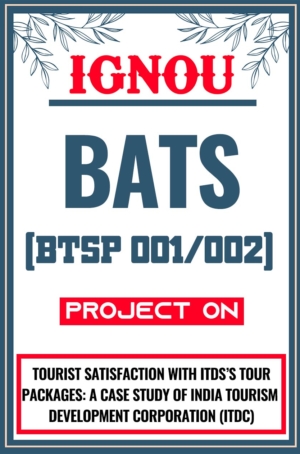Download IGNOU BTSP 002 Project for BATS
IGNOU BATS Project is a 3-year Degree Programme. The programme is of 120 credits. The BATS Programme is designed for those students who are interested in pursuing a career in travel and tourism sector at different level. The IGNOU BTSP 002 Project is aimed at familiarizing you with varied aspects of Tourism, creating awareness about tourism, imparting basic training in organizing Tourism services and opening career opportunities.
The IGNOU BTSP 002 Project will be of use to those, who are interested in employment (direct or indirect in Tourism Industry), intend to make career in Tourism Industry, are providing tourism related services through own enterprises or planning to become such entrepreneur. The programme is also useful for those who are associated with tourism awareness programmes/research and would like to update their knowledge and skills in the field of travel and tourism.
Whatsapp us to get the Personalized (Customized) IGNOU BTSP 002 Project Report and Synopsis for BATS
What should be included in the IGNOU BTSP 002 Project report?
The project report typically includes:
- Title and Introduction: Topic background and objectives.
- Literature Review: Summary of existing research and theoretical framework.
- Methodology: Research methods and data collection techniques.
- Data Collection and Analysis: Presentation and analysis of findings.
- Findings and Discussion: Interpretation of results and their implications.
- Conclusion: Summary and recommendations.
- References: List of sources used.
- Appendices: Supplementary materials, if any.
What types of research methods are commonly used for this IGNOU BTSP 002 Project?
For the IGNOU BTSP 002 Project, you can use various research methods depending on your project’s objectives and scope. Here are some commonly used research methods:
1. Qualitative Research Methods
- Interviews: Conduct structured, semi-structured, or unstructured interviews with industry experts, tourists, or stakeholders to gain in-depth insights into specific aspects of tourism.
- Focus Groups: Organize focus group discussions with participants from various backgrounds to explore their views and experiences related to tourism topics.
- Case Studies: Analyze specific examples of tourism destinations, businesses, or projects to understand their successes, challenges, and best practices.
- Observations: Observe tourist behaviors, activities, or destination management practices to collect real-time data on tourism phenomena.
2. Quantitative Research Methods
- Surveys/Questionnaires: Design and distribute surveys or questionnaires to collect numerical data from a larger sample of tourists, industry professionals, or residents. This method helps in understanding trends, preferences, and patterns.
- Statistical Analysis: Use statistical tools and software to analyze survey data, identify correlations, and test hypotheses related to tourism.
3. Mixed Methods
- Combination of Qualitative and Quantitative: Employ a combination of both qualitative and quantitative methods to provide a comprehensive understanding of the research problem. For example, you might use surveys to gather quantitative data and follow up with interviews for qualitative insights.
4. Secondary Research
- Literature Review: Analyze existing research studies, reports, and academic articles to build a theoretical framework and identify gaps in the current knowledge base.
- Document Analysis: Review and analyze industry reports, policy documents, and historical data related to tourism for secondary insights.
5. Action Research
- Participatory Approach: Engage with local communities, businesses, or organizations to collaboratively address a specific issue or implement a project related to tourism.
6. Experimental Research
- Field Experiments: Conduct experiments in real-world tourism settings to test specific interventions or changes and observe their effects on tourism outcomes.
7. Ethnographic Research
- Cultural Immersion: Immerse yourself in a tourism destination or community to understand the cultural, social, and economic dynamics from an insider’s perspective.
8. Tourism Impact Assessment
- Environmental and Social Impact Studies: Assess the impacts of tourism on local environments, economies, and communities, focusing on sustainability and development.
Samples of IGNOU BTSP 002 Project Topics for BATS
- Tourist Satisfaction With Itdc Tour Packages: A Case Study Of India Tourism Development Corporation (Itdc) New Delhi
- Marketing Of Adventure And Nature Tourism
- A Study Of Destination Branding In The Tourism Industry
- Effect Of The Internet On The Marketing Of Hotels And Tour Operators In City New Delhi
- To Study The Tourism Possibilities In The Poonch Sector
- Government Policies Adopted For The Promotion Of Tourism In Jammu And Kashmira Study About Religious Sites Of Jammu & Kashmir For Pilgrimage Tourism
- A Study To Analyze The Influence Of Tourism On The Environmental Conditions In The City New Delhi
How can you ensure that your analysis is thorough and accurate for IGNOU BTSP 002 Project?
Ensuring that your analysis is thorough and accurate is crucial for the success of your IGNOU BTSP 002 Project. Here are some steps and best practices to help you achieve this:
Develop a Clear Analysis Plan
- Define Objectives: Clearly outline what you aim to discover or prove with your analysis.
- Choose Appropriate Methods: Select analysis methods that align with your research objectives and data type.
Prepare Your Data Properly
- Data Cleaning: Review and clean your data to remove errors, inconsistencies, and outliers before analysis.
- Organize Data: Arrange data systematically to facilitate easy access and manipulation during analysis.
Use the Right Tools and Techniques
- Software: Utilize appropriate statistical or analytical software (e.g., SPSS, Excel, R) to perform your analysis.
- Techniques: Apply relevant analytical techniques (e.g., regression analysis, thematic analysis) based on your research methods and objectives.
Conduct Detailed Analysis
- Explore Data: Conduct exploratory data analysis to identify patterns, trends, and relationships within the data.
- Apply Statistical Tests: Use statistical tests to validate hypotheses and assess the significance of your findings.
Validate Your Findings
- Cross-Verification: Compare your findings with existing literature or data from other sources to validate your results.
- Triangulation: Use multiple methods or sources to cross-check findings and ensure consistency.
Document Your Analysis Process
- Methodology: Clearly document the methods and techniques used in your analysis.
- Rationale: Explain why specific methods were chosen and how they were applied.
Interpret Findings Accurately
- Contextualize Results: Relate your findings to the research objectives and existing literature. Discuss implications and relevance.
- Avoid Overgeneralization: Make cautious interpretations and avoid drawing broad conclusions from limited data.
Seek Feedback
- Peer Review: Have peers or mentors review your analysis to provide constructive feedback and identify potential errors or biases.
- Consult Your Guide: Regularly consult with your project guide to ensure your analysis aligns with academic standards.
Address Limitations
- Acknowledge Constraints: Discuss any limitations in your analysis, such as sample size, data quality, or methodological constraints.
- Suggest Improvements: Propose ways to address these limitations in future research or analysis.
Ensure Ethical Compliance
- Confidentiality: Maintain the confidentiality of sensitive data and adhere to ethical standards in your analysis.
- Accuracy: Report findings truthfully and avoid manipulation or misrepresentation of data.
Review and Revise
- Proofread: Carefully review your analysis and interpretation to correct errors and ensure clarity.
- Revise: Make necessary revisions based on feedback and further reflections.
What are the common challenges faced during the IGNOU BTSP 002 Project?
Common challenges include:
- Selecting a relevant and manageable topic.
- Accessing reliable and sufficient data.
- Time management and adhering to deadlines.
- Ensuring the quality and accuracy of research.
What if you need to make revisions to your IGNOU BTSP 002 Project?
If you need to make revisions to your BTSP 002 Project, follow these steps to ensure the process is effective and thorough:
1. Review Feedback
- Understand Comments: Carefully read and understand the feedback provided by your project guide or evaluator.
- Clarify Doubts: If any feedback is unclear, seek clarification from your guide or mentor.
2. Assess Required Changes
- Identify Areas for Improvement: Determine which sections of your project need revision based on the feedback received.
- Prioritize Revisions: Prioritize changes according to their impact on the overall quality of the project.
3. Revise Content
- Update Information: Make necessary changes to data, analysis, and interpretations. Ensure accuracy and relevance.
- Improve Clarity: Enhance clarity and coherence in your writing. Address any issues related to organization, flow, and readability.
- Correct Errors: Fix any factual, grammatical, or typographical errors.
4. Enhance Sections as Needed
- Literature Review: Update or expand the literature review if additional sources or perspectives are needed.
- Methodology: Revise the methodology section to address any concerns about research design or methods.
- Analysis: Revisit data analysis to ensure thoroughness and accuracy. Incorporate any additional analysis suggested.
5. Check Compliance with Guidelines
- Format and Style: Ensure that the revised project adheres to the formatting and style guidelines provided by IGNOU.
- Requirements: Verify that all project requirements and evaluation criteria are met.
6. Document Changes
- Track Revisions: Keep a record of changes made to the project, noting which feedback points have been addressed.
- Version Control: Save different versions of the project to track progress and ensure that no information is lost.
7. Seek Additional Feedback
- Consult Your Guide: Share the revised version with your project guide for additional feedback before final submission.
- Peer Review: Consider having peers review the revised project for further insights.
8. Proofread the Final Draft
- Final Review: Carefully proofread the revised project to catch any remaining errors or inconsistencies.
- Check Formatting: Ensure that the final document adheres to formatting and presentation standards.
9. Prepare for Submission
- Final Adjustments: Make any last-minute adjustments based on additional feedback or observations.
- Submit on Time: Ensure that the revised project is submitted by the deadline specified by IGNOU.
10. Reflect on the Process
- Learn from Feedback: Reflect on the feedback and revision process to identify areas for improvement in future projects.
- Document Learnings: Note any key lessons learned and how they can be applied to enhance future research or academic work.
What are the best practices for data collection?
- Plan Ahead: Develop a clear data collection plan and tools (e.g., questionnaires, interview guides).
- Ensure Validity: Use reliable and valid methods to gather accurate data.
- Ethics: Obtain consent from participants and ensure confidentiality.
- Pilot Testing: Test your data collection tools to identify and correct issues before full-scale implementation.
What are the key factors that contribute to a high-quality IGNOU BTSP 002 Project?
Several key factors contribute to a high-quality project for the BTSP 002 Project. Here’s a comprehensive list:
1. Clear Objectives
- Define Purpose: Establish clear, specific research objectives and questions.
- Align Goals: Ensure that your project aims and objectives are aligned with the research problem and scope.
2. Robust Research Design
- Methodology: Use appropriate and well-defined research methods that suit your research questions and objectives.
- Sampling: Apply a sound sampling technique to ensure that your data is representative and relevant.
3. Comprehensive Literature Review
- Relevant Sources: Conduct an extensive literature review to build a strong theoretical foundation.
- Critical Analysis: Analyze and synthesize existing research to identify gaps and justify your study.
4. Accurate Data Collection
- Validity and Reliability: Use reliable and valid data collection tools and techniques.
- Ethical Considerations: Obtain necessary permissions and ensure ethical practices in data collection.
5. Thorough Data Analysis
- Appropriate Tools: Employ suitable analytical methods and tools to examine your data.
- Detailed Interpretation: Provide a thorough and clear interpretation of your findings in relation to your research questions.
6. Well-Structured Report
- Logical Organization: Present your report in a logical structure with clearly defined sections (Introduction, Literature Review, Methodology, Results, Discussion, Conclusion).
- Clarity and Coherence: Write clearly and coherently, ensuring that each section flows logically to the next.
7. Originality and Innovation
- Unique Insights: Offer original insights or approaches to the research topic.
- Creative Solutions: Propose innovative solutions or recommendations based on your findings.
8. Accuracy and Precision
- Data Integrity: Ensure accuracy in data entry, analysis, and reporting.
- Correct Findings: Avoid errors or misinterpretations in presenting your results.
Ready to get your IGNOU BTSP 002 Project Report and Synopsis Sample PDF for BATS?
- Call us or WhatsApp us at: 9958947060, 9354637830
- Visit: SHRICHAKRADHAR.COM
-
Sale!

-
Sale!

IGNOU BATS Project (BTSP 001/002) Synopsis/Proposal & Project Report/Dissertation in Soft-Copy (Sample-7)
Original price was: ₹499.00.₹149.00Current price is: ₹149.00. -
Sale!

IGNOU BATS Project (BTSP 001/002) Synopsis/Proposal & Project Report/Dissertation in Soft-Copy (Sample-6)
Original price was: ₹499.00.₹149.00Current price is: ₹149.00. -
Sale!

IGNOU BATS Project (BTSP 001/002) Synopsis/Proposal & Project Report/Dissertation in Soft-Copy (Sample-5)
Original price was: ₹499.00.₹149.00Current price is: ₹149.00. -
Sale!

IGNOU BATS Project (BTSP 001/002) Synopsis/Proposal & Project Report/Dissertation in Soft-Copy (Sample-4)
Original price was: ₹499.00.₹149.00Current price is: ₹149.00. -
Sale!

IGNOU BATS Project (BTSP 001/002) Synopsis/Proposal & Project Report/Dissertation in Soft-Copy (Sample-3)
Original price was: ₹499.00.₹149.00Current price is: ₹149.00. -
Sale!

IGNOU BATS Project (BTSP 001/002) Synopsis/Proposal & Project Report/Dissertation in Soft-Copy (Sample-2)
Original price was: ₹499.00.₹149.00Current price is: ₹149.00. -
Sale!

IGNOU BATS Project (BTSP 001/002) Synopsis/Proposal & Project Report/Dissertation in Soft-Copy (Sample-1)
Original price was: ₹499.00.₹149.00Current price is: ₹149.00.








